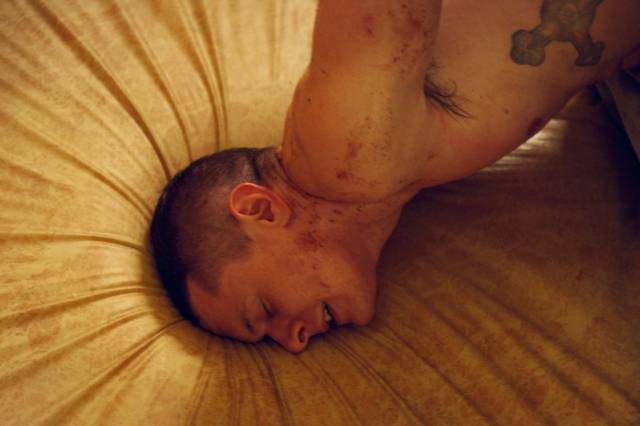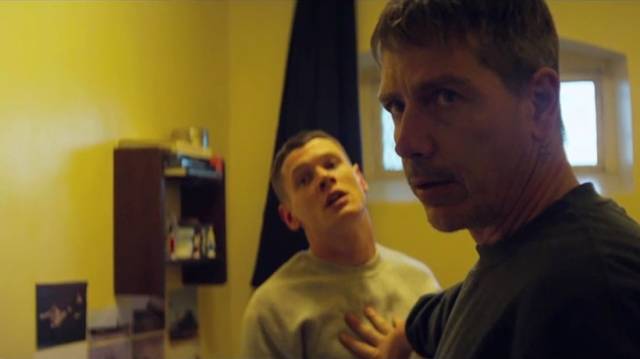
 In Starred Up, director David Mackenzie takes us inside the violent world of a British prison as seen through the eyes of young Eric Love (Jack O’Connell) who has just been transferred from a Young Offender Institution to an adult jail. His prison mates include his father Neville (Ben Mendelsohn) who tries hard to keep his son safe from the other inmates. Eric also catches the eye of Oliver Baumer, a sensitive counselor who hosts weekly anger management group meetings. Baumer is sure that these men’s violent instincts can be controlled, even if the rest of the system seems opposed to rehabilitation, seeing it as a waste of resources.
In Starred Up, director David Mackenzie takes us inside the violent world of a British prison as seen through the eyes of young Eric Love (Jack O’Connell) who has just been transferred from a Young Offender Institution to an adult jail. His prison mates include his father Neville (Ben Mendelsohn) who tries hard to keep his son safe from the other inmates. Eric also catches the eye of Oliver Baumer, a sensitive counselor who hosts weekly anger management group meetings. Baumer is sure that these men’s violent instincts can be controlled, even if the rest of the system seems opposed to rehabilitation, seeing it as a waste of resources.
Written by Jonathan Asser, and based on his own experiences as a prison counselor, Starred Up is a gritty, often moving drama that seemed like the perfect fit for Mackenzie’s directorial skills. Mackenzie has made a career for himself delivering male-driven character studies, that deftly combine noir sensibilities with oft-explosive performances from his leads. In Starred Up, O’Connell gives the kind of performance that makes you go “who is this guy?” and we will most likely be hearing about him for a while (he will star in Angelina Jolie’s sophomore directorial effort Unbroken in late 2014). We sat down with Mackenzie who discussed his unique shooting approach, the unwritten rules of the British penitentiary system and O’Connell’s revelatory work.
If we go all the way back to Young Adam, Perfect Sense and now Starred Up, you have a tendency to be interested in stories about men who find it impossible to go against their nature. They know something is wrong, but for some reason they will still go and do it. What keeps drawing you to these stories?
It’s interesting...it’s about people who can’t help themselves is what you’re saying.
Yeah, basically. These men know they shouldn’t be acting the way they’re acting…
(Laughs and nods) Yeah, it’s in their nature. I don’t know, I’m not sure I see it in exactly the same way. We could also look at them as people who are struggling against who they are. They don’t necessarily know who they are, I think Ewan McGregor’s character in Young Adam doesn’t understand who he is. He’s fighting the idea that he doesn’t care about things and I guess that idea, of male characters who think they’re tough enough that their emotions can’t take the best of them, or that their sensitivity can be pushed away...and it turns out it’s not that way. In that interpretation I can see a connection between all of them.

And you also like to put them under very extreme environments, like you’re doing experiments to push and see how far they’ll go under these unique situations. In Young Adam, it’s a boat house, in Perfect Sense you turn their bodies into cages of sorts and here we obviously have the prison.
So you have this image of me as some evil guy doing experiments and treating characters like insects? I hope not! I think putting people under this dramatic microscope makes sense. The idea that you’re taking a moment in a character’s life or moments in their story when they’re being stretched and pulled and being forced into making decisions, make for interest subjects for films. I guess if I’m drawn to that it’s because it feels dramatically interesting, there’s also an aspiration in looking for the truth in there and to some extent although we’re dealing with fiction I’m interested in the truth underneath things.
I can’t think of too many movies that have been shot chronologically, E.T. maybe…
(Laughs) I didn’t know E.T. was shot chronologically! That’s amazing! I think those journeys where you take with inexperienced actors where you can take allow something to grow is remarkable and makes it good to have films shot sequentially.
And you’ve also mentioned that you were only able to shoot sequentially because of the location, right?
Yeah.
What were some of the pros and cons of shooting like this?
The pros are very easy because you go on the story together as a team and you can engage, you wanna see what’s happening next in a funny kind of way and the actors don’t have to worry about where their actions fit in the emotional puzzle like they would if it was out of sequence. As a director you don’t have to worry about anything other than the scene you’re in, it allows you to live in the moment. The past is done and the future is not relevant, you’re living the scene like there’s no tomorrow, which is very interesting. I know Jack deliberately put the story on the back of his mind and for a film that’s very immediate it was very important. The only cons were that the producers had to bring us back and forth to the location and in the case of this film for example, the last 20 minutes of the film were shot over the last four days and we were all exhausted, there were scenes filled with so much tension and drama, and it was a very hard last week. But I hope the flavor of that last part of the movie is also imbued with that. The other good thing were the group scenes, which normally we shot in one or two days, in this case since we had four or five days between scenes, the actors could go away, think about their characters so when we came back into the same room, the flavor was different, it was interesting. The group scenes were some of my favorite in the film, the schedule was brutal but we had a lot of fun.
Jonathan Asser, the screenwriter was with you during the entire shoot, did he change the characters along the way when he realized something didn’t work?
There was a little bit of that, particularly in some of Neville’s stuff with Ben. We changed things according to the character dynamics, but the actors would ask Jonathan about the characters and there were many questions about prison life. I’ve only done a certain amount of research but he’s lived the world, so it was good to have him on for that. Having a writer on the set, also allowed for improvisation because the actors made sure they were still respecting the writer.
 We never really know why these characters are in prison, why was that?
We never really know why these characters are in prison, why was that?
It’s pretty much an unwritten role that most people in British jails don’t actually say why they’re there for. It’s a rude question to ask, if someone wants to tell you, fine, but you’d never ask.
We don’t even see the guards discussing it...
It’s because the film isn’t about judging the characters, we know these men are in jail because they’ve all done something bad, that’s a given, so the details are not what we wanna focus on.
There’s this great speech Jack’s character gives about how prisoners keep the system going that’s quite thought provoking and yet the film never turns into a message movie.
My taste and Jonathan’s was that we had no interest in making that sort of movie. That scene actually came late in the process and it was at my request for us to have a scene to show that Eric is able to be articulate, intelligent and defiant. It was important for me to show he was articulate in a non-violent way. I also think what he describes about the self perpetuating interdependency of the penitentiary system is also very true.
How complicated was it to establish the prison hierarchy?
Not very, you get a pretty good sense of how the hierarchy works almost instinctively.
I thought it was quite interesting how along with Michael McDonough, the cinematographer, you created this notion that this prison was completely isolated from the world. In scenes where we see some windows, all we see coming through is an overpowering, milky light that doesn’t even let us see the sky outside. It’s not until one of the very last scenes when you give one of the characters a crack through a window where he sees grass. Can you talk about how you set up the visuals?
It was very important to me that we live in that world as they do. You have no objectivity about the outside world and the only moments when you can see the outside world is for example when we show one of the characters outside smoking a cigarette. There’s a sense that this world is the only word there is.
How did you prepare Jack for such a physically and emotionally demanding performance?
Preparing Jack was mostly making sure he understood I trusted him and that he trusted me. It was a very intuitive trusting thing and he just went for it and I was happy to let him do it. I think it’s a very powerful performance.
All the physicality in the film made me wonder if you ever see yourself directing an action movie…
I am talking about a semi-action movie with Warner Bros. The visceral side of it as opposed to the choreographed kind of action is very interesting. There’s this American/Colombian kind of rescue movie that might come along and I’m also doing a medieval warrior movie. I’m trying to take some of the realism of Starred Up and apply it to that, which I hope will be very interesting.
Starred Up is now playing in New York theaters.